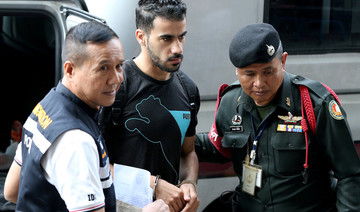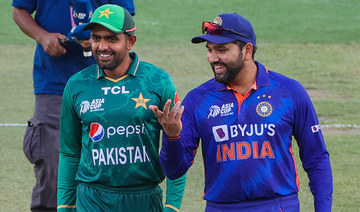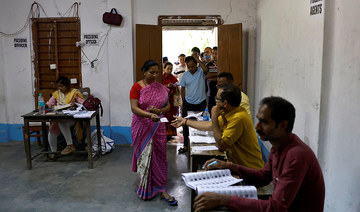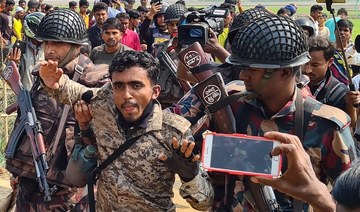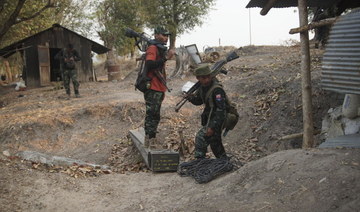BANGKOK: A Thai political party on Friday named a princess as its nominee to be the next prime minister, upending tradition that the royal palace plays no public role in politics and upsetting all predictions about what may happen in next month’s election.
The selection of 67-year-old Princess Ubolratana Mahidol by the Thai Raksa Chart Party marks a shock realignment of Thai politics, as she is now affiliated with a political machine that had been dismissed by hardcore royalists as opposed in spirit to the monarchy.
Her selection to lead the government after the March 24 general election also pits her against the preferred candidate of the military, which is considered one of Thailand’s most royalist institutions.
Current Prime Minister Prayuth Chan-ocha, who led the 2014 coup that ousted Thailand’s last elected government, on Friday accepted his selection as candidate to lead the next government by Palang Pracharat Party, widely considered a proxy for the military.
Ubolratana, whose official name is considerably longer than that under which she was registered with the Election Commission, is the first-born child of the late King Bhumibol and Queen Sirikit. Although her father’s favorite, she was virtually disowned by him in 1972 when she married an American who was a fellow student at the Massachusetts Institute of Technology. She lost two of her royal titles and lived in the United States, where she and her husband, Peter Jensen, had three children. Only after a bitter divorce did she move back permanently to Thailand in 2001.
Since then she has thrown herself into charity work, especially her “To Be No. 1” foundation to fight youth drug abuse. She also frequently promotes Thai tourism and movies at international forums. In general, like most of the royal family, she publicly kept herself aloof from Thailand’s recent political turmoil.
Thai politics for more than a decade has been shaken by violent street protests, coups and comebacks, but those are familiar events in Thai history. However, the death in 2016 of King Bhumibol Adulyadej added a major element of uncertainty, as he had served as a stabilizing force since taking the throne in 1946.
The other destabilizing element in Thai politics was the 2001 election as prime minister of telecommunications tycoon Thaksin Shinawatra.
His populist policies delivered him unmatchable electoral majorities, but he was resented by the traditional ruling class, including royalists and the military, and the army deposed him in a 2006 coup. Has been in exile since 2008 to avoid serving jail time on a corruption conviction he insists was politically motivated.
Thaksin’s well-funded political machine returned to power twice since and is seen as the key element in arranging for Ubolratana’s selection because she cast her lot with a Thaksin-affiliated party.
Most observers of Thai politics agree that Thaksin aggressively pursued good relations with Ubolratana’s brother, current King Maha Vajiralongkorn, and friendship with the princess herself. These links were formed even as royalists and others loyal to the late King Bhumibol accused Thaksin of showing disrespect for the throne, and even of harboring secret republican tendencies.
When King Maha Vajiralongkorn, who has lacked the same level of devotion most Thais had for his father, ascended to the throne, conventional wisdom saw him as tightening his grip on power by allying himself closely with the military.
The surprise entry of his sister Ubolratana into politics — assumed to be with his blessing — raises questions about whether the long-lasting partnership of the palace with the army is in jeopardy.
Historic candidacy of princess upends tradition in Thailand
Historic candidacy of princess upends tradition in Thailand
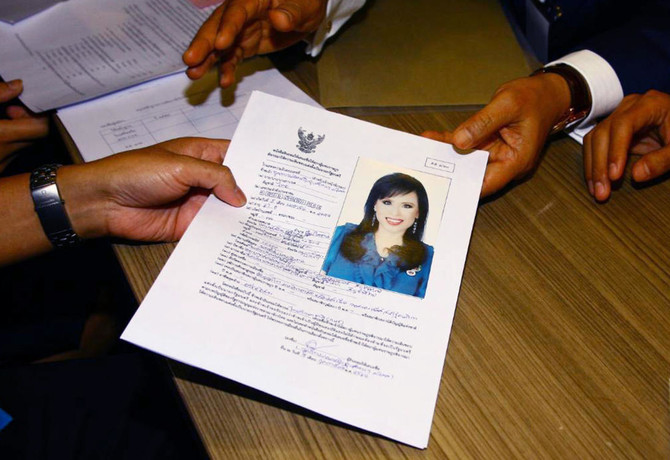
- It marks a shock realignment of Thai politics, as she is now affiliated with a political machine that had been dismissed by hardcore royalists as opposed in spirit to the monarchy
- Ubolratana lost her royal titles when she married an American who was a fellow student at MIT
Polish flag carrier LOT cancels Friday flights to Tel Aviv and Beirut, PAP reports

- Decisions about future flights would be made on an ongoing basis
WARSAW: Polish national airline LOT canceled flights on Friday to Tel Aviv and Beirut due to the unstable situation in the region, a spokesperson was quoted as saying by state news agency PAP.
“Today’s flight 151/152 to Israel from Warsaw and to Beirut 143/144 have been canceled,” Krzysztof Moczulski told PAP. He said decisions about future flights would be made on an ongoing basis.
French police arrest man who threatened to blow himself up at Iran’s Paris consulate

PARIS: A man who had threatened to blow himself up at Iran’s consulate in Paris was arrested by police, a police source said.
French police earlier cordoned off the Iranian consulate, Reuters reporters saw.
A police source told Reuters the man was seen at about 11 am (0900 GMT) entering the consulate, carrying what appeared to be a grenade and explosive vest.
Police earlier said they were at the scene and asked the public to avoid the area but provided no further details.
Service was interrupted on a nearby metro line for security reasons, the RATP metro company said.
A person at the Iranian embassy who responded to a call from Reuters declined to provide any information on the situation.
It was unclear whether the incident had any link to the escalating tensions between Iran and Israel.
Earlier on Friday, explosions echoed over the Iranian city of Isfahan in what sources described as an Israeli attack, but Tehran played down the incident and indicated it had no plans for retaliation — a response that appeared gauged toward averting region-wide war.
Blinken says US ‘not involved in any offensive operation’

- ‘All I can say is for our part and for all the members of the G7 our focus is on de-escalation’
CAPRI, Italy: US Secretary of State Antony Blinken on Friday refused to comment on reports of an attack by Israel on Iran, beyond saying Washington was “not involved in any offensive operation.”
Speaking to journalists after a meeting with G7 counterparts in Italy, he declined to answer repeated questions about explosions in Iran, and reports that Israel had carried out retaliatory strikes.
“I’m not going to speak to these reported events... All I can say is for our part and for all the members of the G7 our focus is on de-escalation,” Blinken told a press conference on the island of Capri.
“The US has not been involved in any offensive operation,” he said.
Speaking to reporters earlier, G7 host Antonio Tajani, the foreign minister of Italy, said Washington had been informed in advance of the strikes, without giving details.
“The United States were informed at the last moment,” he said, adding that “it was just information” passed on — without saying who by.
The reports dominated the G7 Friday, with Tajani forced to change the agenda, but little public information emerged.
In its final statement, the Group of Seven ministers said: “In light of reports of strikes on April 19th, we urge all parties to work to prevent further escalation. The G7 will continue to work to this end.”
Israel had warned it would hit back after Iran fired hundreds of missiles and drones at Israel almost a week ago, in retaliation for a deadly strike — which Tehran blamed on its foe — that levelled Iran’s consular annex at its embassy in Syria.
Indians head to the polls in world’s biggest election
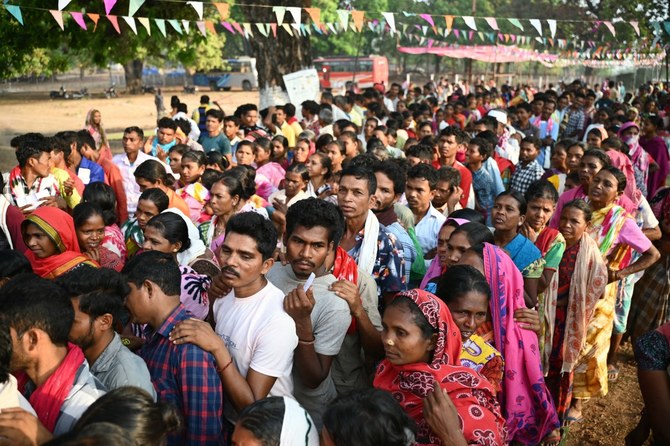
- Polling takes place in phases over the next six weeks, with results expected on June 4
- Over 968 million people are registered to vote, with 168.6 million casting ballots on Friday
NEW DELHI: Indian voters headed to the polls on Friday for the first phase of the world’s biggest general election, in which Prime Minister Narendra Modi is aiming for a rare third consecutive term.
More than 968 million people are registered to vote, with polling taking place over the next six weeks, as results are expected on June 4.
After April 19, the other voting dates will be April 26, May 7, May 13, May 20, May 25 and June 1, with some states completing the process on a single day, and others having it spread out in several phases.
Friday’s polling was held in 21 states and union territories, including the most populous ones such as Uttar Pradesh, Bihar, Rajasthan, Tamil Nadu, and Maharashtra, as well as smaller northeastern states and the northern Himalayan territory of Jammu and Kashmir.
In Kashmir, this is the first election since its special autonomous status and statehood were scrapped through the Indian government’s controversial constitutional amendment in 2019.
Chief Election Commissioner of India Rajiv Kumar told reporters on Friday that 168.6 million people were expected to cast their ballots on Friday.
“The preparations started, actually, two years back. Wide range of preparations … It’s a tremendous exercise,” he said.
MAIN CONTENDERS
More than 2,600 political parties are registered in the marathon election and 543 contested seats in the lower house of Parliament. The party or coalition that wins at least 272 is going to form the government.
Modi is targeting 400 seats for the National Democratic Alliance led by his Hindu nationalist Bharatiya Janata Party, which has been in power since 2014.
He is challenged by an alliance of two dozen opposition parties — the Indian National Developmental Inclusive Alliance, or INDIA, led by the Congress Party, which has ruled the country for close to 45 years since its independence in 1947.
The key leader of the opposition coalition is Rahul Gandhi — the son of Rajiv Gandhi, a grandson of Indira Gandhi, and a great-grandson of Jawaharlal Nehru, all of whom served as prime ministers of India.
While the opposition is trying to appeal to Indian youth with promises to tackle unemployment, free education and medical facilities, the BJP has deployed the same tactics as in previous polls — by mobilizing voters through majoritarian Hindu sentiment, despite constitutional provisions that make it a secular state.
Opinion polls show Modi as frontrunner, with 48 percent of respondents in the most recent survey released by the Centre for the Study of Developing Societies last week naming him as their choice for the prime minister. Gandhi was second, preferred by 27 percent.
“Modi has created an image of a powerful leader, a leader who is not only popular in India but outside too. He has also created an image of not pandering to Muslim communities in India … This image of a leader who does not appease the Muslim sentiments appeals to the Hindu masses. Politics of polarization helps Modi to build an image and aura among a large section of the Hindu voters,” Prof. Venkat Narayan, political analyst and commentator, told Arab News.
“Then the use of social media and the mainstream media is also there to create an image and broaden Modi’s appeal. The media plays a great role in creating this image, they are soft towards Modi and do not ask critical questions.”
If Modi wins the election, he will become the second prime minister, after Nehru, to succeed in three consecutive polls.
“Modi is leading in the polls as he has created an image of doing a lot for different sections of the society. Besides, he projects himself as squeaky clean. People also think that as he has no children, he has no reason to be corrupt or be on the take,” Sanjay Kapoor, analyst and editor of the English-language political magazine Hardnews, told Arab News.
“There are other reasons for his popularity, which include adroit use of media and social media that control all criticism against him. Then there are issues of raising India’s global profile and pursuing an independent foreign policy.”
FUTURE FOREIGN POLICY
Whoever wins the election, the foreign policy direction is likely to remain broadly unchanged, except for India’s orientation toward Israel and Palestine.
Support for Palestine and Palestinian statehood was once an integral part of India’s foreign policy, but in recent years, under Modi’s rule, New Delhi has become closer to Tel Aviv, despite civil society protests breaking out across the country against Israel’s deadly war on Gaza.
“If the INDIA alliance comes to power, then we may see a change in our policy towards Israel and Palestine. The INDIA alliance is sympathetic to Palestinians,” Kapoor said.
“We expect that the INDIA alliance will also restore ties with neighbors like Pakistan, (and) revive SAARC (South Asian Association for Regional Cooperation).”
The member states of SAARC — a regional intergovernmental organization and geopolitical union of states in South Asia — are Afghanistan, Bangladesh, Bhutan, India, Maldives, Nepal, Pakistan, and Sri Lanka.
The last biennial SAARC summit was hosted by Nepal in 2014. Pakistan was to host the summit in 2016, but it was stalled after India refused to participate, following an attack on an Indian army camp in Kashmir that New Delhi blamed on Pakistan-based militants.
VOTERS’ CONCERNS
According to the Centre for the Study of Developing Societies survey, unemployment emerged as the top concern for 27 percent of respondents.
Some 62 percent also said it has been more difficult to find a job in the last five years — during Modi’s second term in office.
“The biggest concern remains inflation and unemployment. The possibility of getting a job decreases if you study more. People are forced to leave India in search of jobs. Some have even gone as far as Russia and Israel,” Kapoor said. “The situation is really dismal.”
Rising prices and inflation were also a major issue — the top concern for 23 percent of the people surveyed by the CSDS.
“Women and the middle class are concerned about the rising prices. Modi is trying to divert attention from these main issues by talking about religion and temples,” said Shashi Shekhar Singh, associate professor at Satyawati College at the University of Delhi.
The CSDS pre-poll also revealed that despite the ruling party’s narrative promoting Hindu nationalist dominance to establish a majoritarian state in India, only 11 percent of respondents saw India as solely for Hindus.
But there were fears the reality on the ground could change if the BJP tried to amend India’s liberal and democratic constitution.
“Indian secularism and the very idea of a plural democracy is at stake,” Singh said.
“There is a fear that if the BJP comes to power with the thumping majority, the liberal and secular democracy will breathe its last. The BJP might lead the nation further down the path of a Hindu majoritarian state.”
ASEAN says ‘deeply concerned’ over escalating Myanmar violence
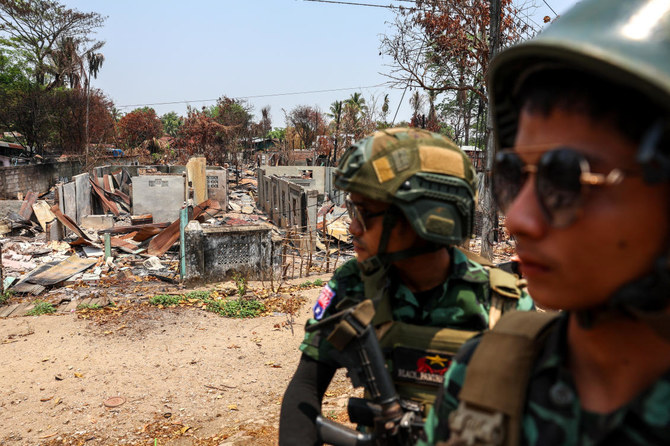
- ASEAN foreign ministers urge ‘all parties for an immediate cessation of violence’ in Myanmar
BANGKOK: Regional bloc ASEAN said it is “deeply concerned” about a recent upsurge in fighting in Myanmar, after fierce clashes over a key trading hub near the Thai border.
The foreign ministers of the Association of Southeast Asian Nations urged “all parties for an immediate cessation of violence” in Myanmar, which has been roiled by conflict since the military seized power in a February 2021 coup.
The ministers’ statement issued late Thursday said ASEAN was “deeply concerned over the recent escalation of conflicts, including in the area of Myawaddy.”
The military was last week forced to pull its troops out of positions in the valuable trading post after days of battling with the Karen National Union (KNU) — a long-established ethnic minority armed group — and other anti-junta fighters.
It was the latest blow suffered by the junta, which has suffered a string of battlefield losses in recent months, with some analysts warning it is its most significant threat to date.
Myawaddy is Myanmar’s main trade link to Thailand, and usually sees over a billion dollars worth of trade annually.
The clashes saw people flee across the border into Thailand — from where gunfire and the boom of artillery barrages could be heard.
Thailand has said it is ready to receive people from Myanmar, though the kingdom’s foreign minister warned it would not tolerate any violation of its sovereignty.



